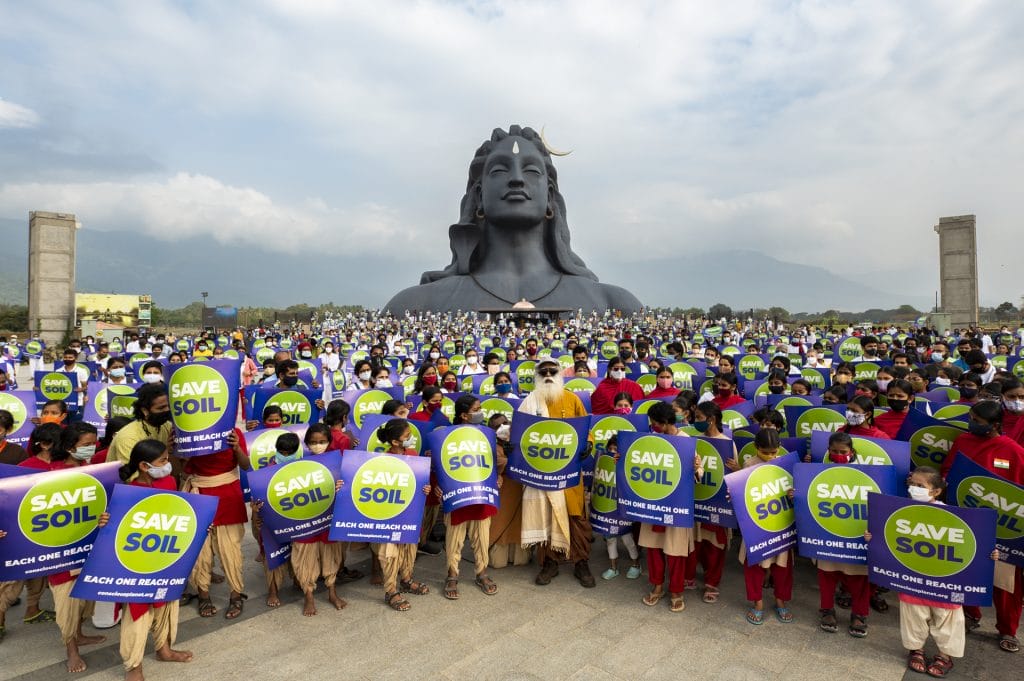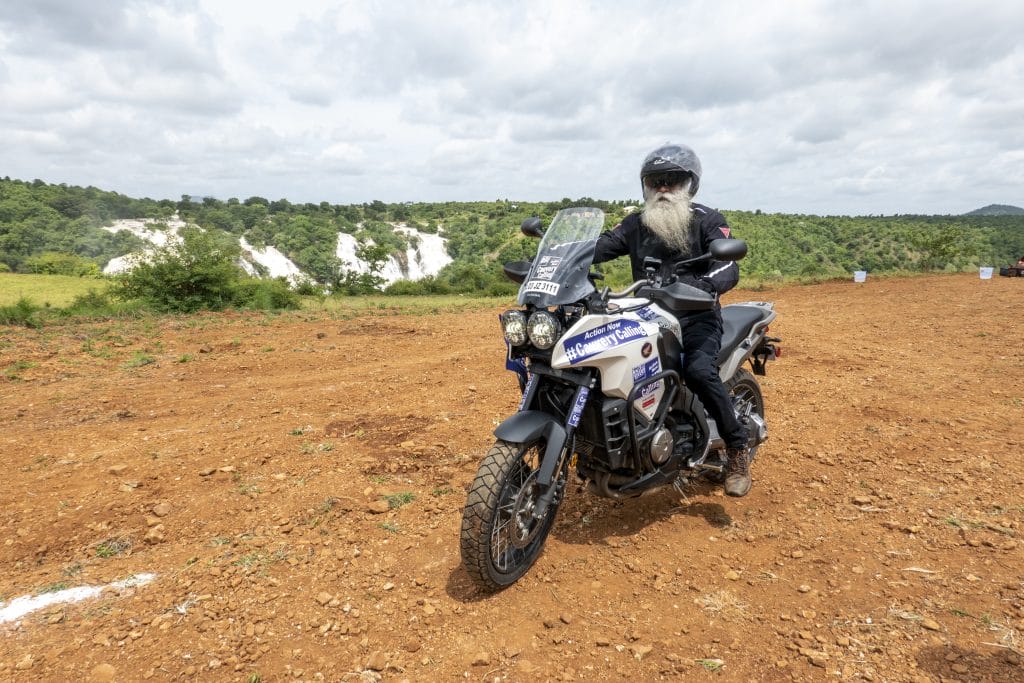The movement aims to reaffirm the vital role that soil plays in our lives.
By Ashima Sethi
Many of us within the community are familiar with Sadhguru, the visionary. Ranked amongst the 50 most influential people in India, he’s a yogi, mystic and New York Times bestselling author, and in 2017, he was awarded the Padma Vibhushan by the Government of India, the highest annual civilian award that recognises exceptional and distinguished service.
This month, Sadhguru is launching a global environmental campaign called the Conscious Planet movement, which aims to engage society to take decisive action on issues like climate change and ecological degradation. To give you a better idea of why we need to pay attention to the soil beneath our feet, it’s important to note that 87 percent of life forms on the planet, ranging from microbes to worms, insects, birds, other animals, humans, plants, trees, and other vegetation, is sustained by 39 inches of topsoil…that is now in danger.
Over the last 40 years, 40 percent of the world’s topsoil has been lost. The United Nations have predicted that we only have enough soil left for 80-100 harvests, which equates to between 45-60 years of agriculture. Without soil, we don’t have food. Therefore, it is imperative we protect our soil for future generations.
“But, how?” you ask. The movement focuses on several steps, beginning with educating the public about the role that soil plays in regards to securing a sustainable future for the planet and having this lead to policy redirection. The soil we step on every day affects all aspects of our lives, including air, water, bio-diversity, and the socio-economic well-being of entire nations. Subsequently, it is time we turn our attention towards healing the soil.
To raise awareness, Sadhguru will be riding his motorcycle alone from London to New Delhi in 75 days, touching 24 nations and covering an impressive 30,000km. The starting location was chosen as it is where the Cauvery Calling Project was initiated, which has enabled 125,000 farmers to plant 62 million trees to revive soil and River Cauvery.
To better understand how this pressing issue affects us as Thai-Indians directly, Masala spoke to a volunteer from the Conscious Planet movement for their insights.

Although we are aware that globally soil degradation is a pressing issue, can you provide some insight or statistics that are specific to Thailand to give our readership a better grasp about how it is affecting them on a local level?
We, as a world, are in the midst of an ecological crisis that majority of us are unware of – ‘Soil extinction’. We are experiencing rapid soil degradation, with 52 percent of the world’s agricultural soil already degraded (UNFAO). With 95 percent of our food coming from soil, it is the most critical resource we have, without which basic survival is also unthinkable. This is not just an ecological challenge, it is an existential threat.
According to the Land Development Department (LDD) under the Agriculture and Cooperatives Ministry, more than 54 percent of agricultural land across Thailand is below farming-grade quality. Land degradation in Thailand is mainly due to improper land utilisation, inappropriate land management, and deforestation that in turn lead to soil erosion. About 4.8 percent of forest land was converted to other land use types during 2002 to 2013.
In addition, the land productivity has declined in 21 percent of the land area of Thailand with 0.03 percent loss of Soil Organic Carbon (SOC) during 2000 to 2010… The conversion of forests to other land uses, and the use of unsuitable areas for agriculture, are contributing to land degradation, by causing a decline in soil productivity, which in turn affects agricultural productivity and human well-being. It leads to political, social and environmental security problems; especially the balance of water, energy and carbon cycle including climate change.
Solving Thailand’s deteriorating soil — the lifeblood of agriculture – requires commitment from policymakers and innovative tools, as well as collaboration from farmers themselves. Denuded mountains and mono-cropping, as evident in vast areas of the northern province of Nan, have brought severe soil erosion and degradation, affecting local communities.
The problems have been triggered by the felling of trees which hold soil in place and shelter areas from wind and flowing surface water. The lack of trees has contributed to a rapid decline in nutrients in the soil and thus agricultural productivity.

As members of the Thai-Indian community, what resources do you recommend we look into to better understand the problem at hand?
Firstly, it is crucial to understand more about the issue, and make everyone else aware of it. Here are some resources you can use:
– www.consciousplanet.org for info about the problem, scientific data, and ways to get involved. There are also a social media toolkits available.
– https://bit.ly/3hsD2zH for a deck you can use to share the facts
-There will also be interactive online sessions on 11am (SGT) 5th March and 6pm (SGT) 10th March about becoming an Earth Buddy. Register here: https://isha.to/intro-to-savesoil
What can we do as Thai-Indians to support the growing save soil movement, beginning with what we can do in regards to changing our day-to-day habits?
The need of the hour is to make as many people aware of this situation, which has the potential to threaten our existence, at the very least. To support the Save Soil movement, everyone can do their bit on a daily basis by speaking about this issue to at least one person every day, share about this on social media, or any other way to spread awareness. In terms of changing habits, understanding that we have limited resources and make use of them consciously, be it food, clothing, water or anything else is a change all of us can bring about on a daily basis.
What can we do to foster long-term sustainable change?
The only way to halt any further damage to soil is by concerted global policy action. And for this, we require policy makers and governments to implement relevant policies. So as individuals, each one of us should become conscious about the danger that we are facing, and voice our concern for ecology.
Sadhguru says, “Ecological issues must become election issues and political parties must give significance to ecological issues in their manifestos. Governments must be elected for their concern for ecological issues. Only when ecology becomes an election issue, will it become government policy, and only then will there be large budgets allocated so that solutions manifest.”
While the solutions to this issue are not rocket science; it is just a question of application. Are we willing to do it in time, so that we minimise the suffering for every creature on this planet? That is the question. If we start now, in 15 to 25 years, there will be a significant turnaround. But let’s say we wait for another 25 to 50 years, and then try to turn it around, they say it may take up to 200 years to turn around. And that period is going to be disastrous for human beings as a species. That’s why there is an urgency about what we need to do.
Additional thoughts you’d like to convey to our readers.
Effective communication about this grave existential threat is the most critical need of the hour. It is safe to say that most people have not heard of soil extinction and know nothing about its catastrophic impact. This must change. We are nourished by soil, so each one of us must become an equal and invested stakeholder in this battle to Save Soil. As critical as the challenge is, it also offers the best opportunity to rally the world behind a unifying cause. “Once there is no richness in soil, then we have forsaken the planet in many ways.” says Sadhguru, and asks for ‘Each one to reach one’, to take this movement forward






